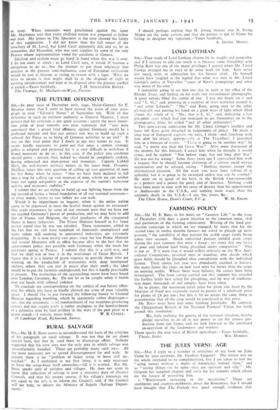LORD LOTHIAN
SIR,—Your study of Lord Lothian charms by its insight and sympathy, and if I venture to add one touch it is because some friendship with Philip Kerr was one of the many privileges I gained when Mr. Lloyd George engaged me in 1923 to do some work for him. Kerr never lost touclg with, or admiration for, his former chief. He himself would have laughed at the legend that what was best in Mr. Lloyd George's policy at Versailles " came of Kerr's promptings and what was worst of his own."
I remember going to see him one day in 1928 at the office of the Rhodes Trust, and finding on his walls two astronomical photographs. A great nebula filled the centre of one. I put my finger on it and said " L. G.," and, pointing to a number of stars scattered around it, " and other Liberals." " No," said Kerr, going over to the other photograph and putting his hand on a great mass of light which filled almost the whole of it, " No ; that is L. G.," and, indicating a few pin-point stars which had just managed to get themselves on to the photographic plate, he added "and all other politicians! "
This unwavering admiration for Mr. Lloyd ,George's intellect and force left Kerr quite detached in judgements of policy. He made a long tour of European capitals—in 1923, I think—and, lunching with him after his return, appropria:ely at The Travellers', I provoked him to a forecast of events. "There is going to be another war." he said, " a worse war than the Great War." After some discussion of the reasons for this forecast, I asked him when he thought it would come, and he replied: " Not before 1940, but not long after that." He was not far wrong! Some three years ago I approached him with a request that he should become chairman of a certain social service organisation and he refused, saying: " Nothing matters except the international situation. All the work you have been talking of is splendid, but it is going to be swamped unless war can be averted." He went on to speak of his faith in the British Commonwealth as a pattern and a power for good, and of America. Nothing could have been more in tune with his sense of destiny than his appointment as Ambassador to the U.S.A., and nothing more tragic than his untimely death in the U.S.A.—I am, Sir, yours, &c.,
The Choir House, Dean's Court, E.G. 4. W. M. EAGAR.






























 Previous page
Previous page